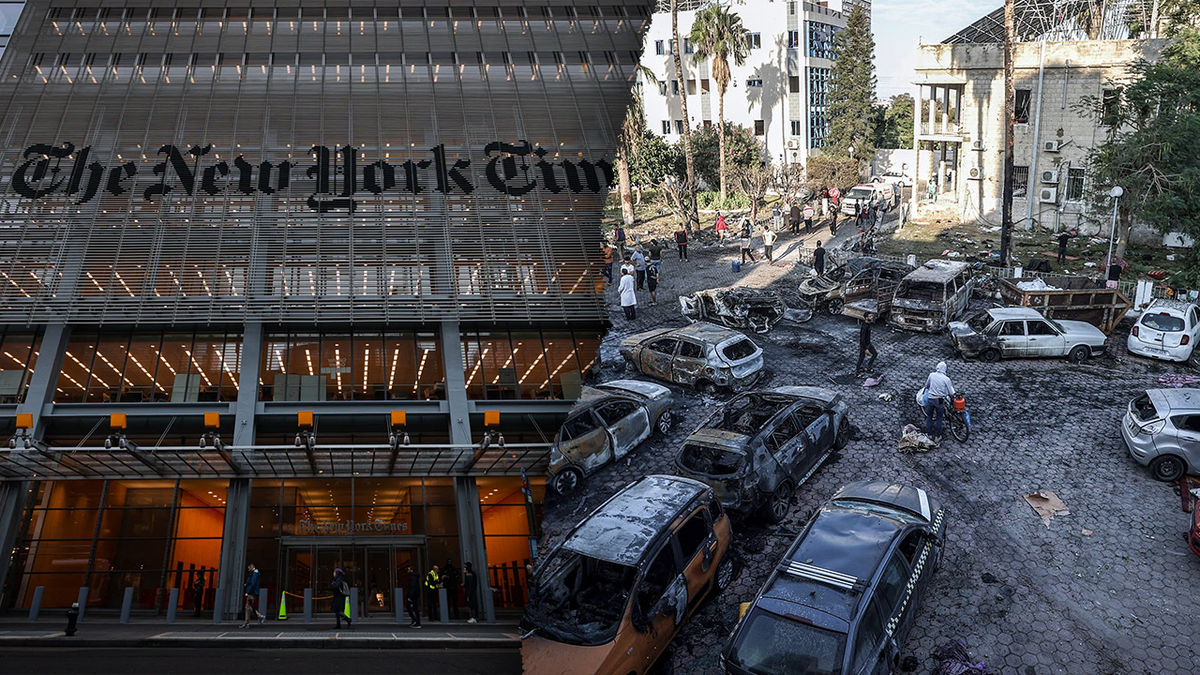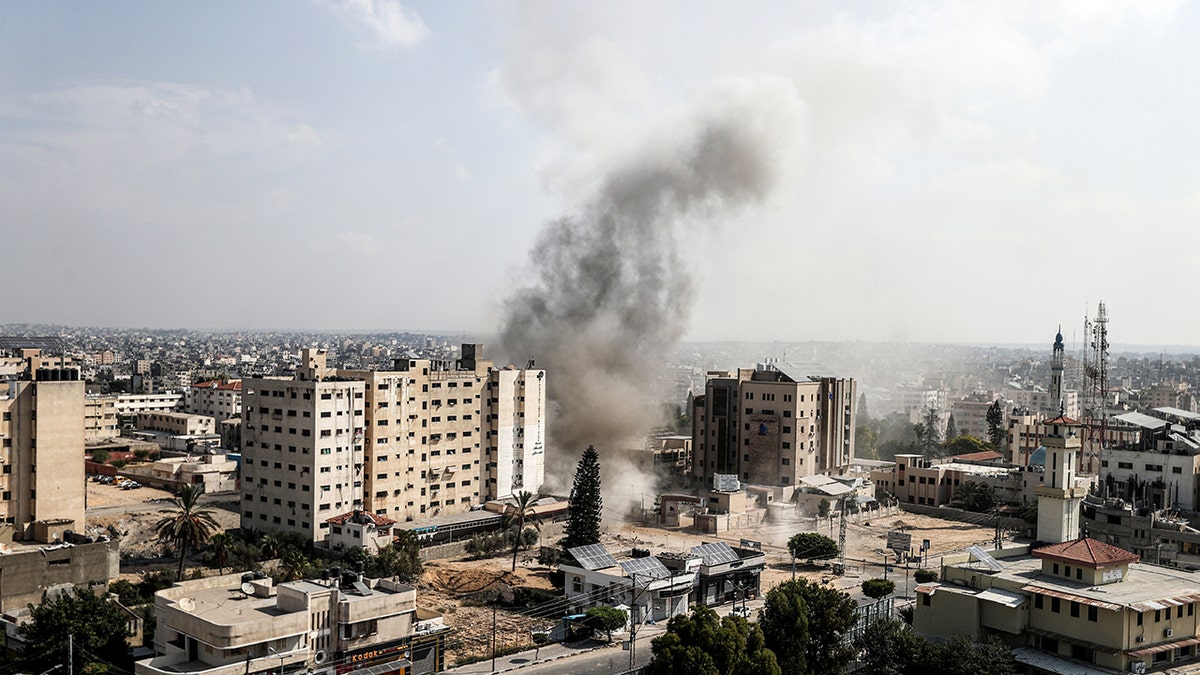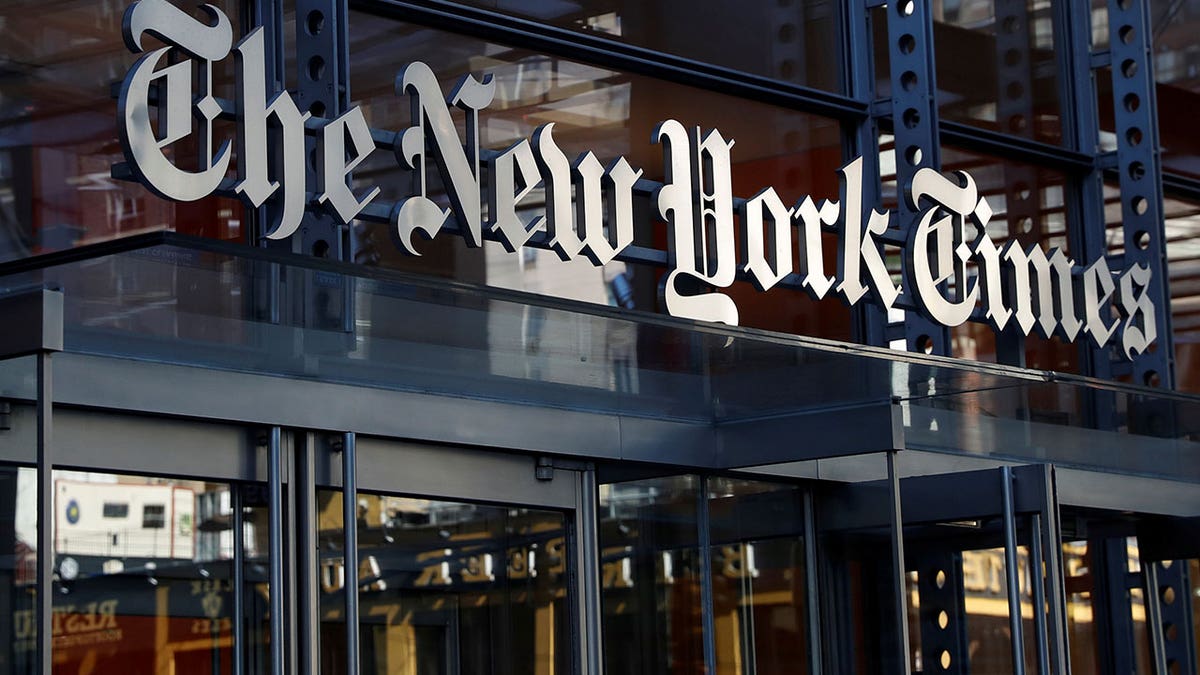Jews respond to New York Times initial report on Gaza hospital explosion
Pro-Israel protesters in the Boston Common Monday night said they believe the New York Times' initial coverage of the Gaza hospital blast put Jews in danger around the world.
New York Times Slack messages revealed internal concerns surrounding its framing of the Gaza hospital bombing story that ultimately resulted in a lengthy editor's note, according to a report.
On Monday, the New York Times admitted that "editors should have taken more care with the initial presentation" of the explosion that occurred at a Gaza hospital last week after the paper "relied too heavily on claims by Hamas." The terrorist organization that rules the Palestinian territory blamed an Israeli airstrike in a story that quickly spread.
The lengthy Times editor's note said the initial report "left readers with an incorrect impression" of the events that transpired and said it should have "taken more care" with the presentation of the information and identifying what could be verified.
A Wednesday article from Vanity Fair suggested that senior editors appeared to brush off concerns from an international editor and a junior reporter stationed in Israel.

New details have emerged from internal messaging on The New York Times Gaza hospital story. ( Fox News Photo/Joshua Comins/Ali Jadallah/Anadolu via Getty Images)
The timeline of events laid out by the Slack messages is as follows.
Shortly after the Times published the initial story "Israeli Strike Kills Hundreds in Hospital, Palestinian Officials Say," on October 17, a senior news editor tagged two other senior editors and wrote, "I think we can be a bit more direct in the lead: At least 500 people were killed on Tuesday by an Israel airstrike at a hospital in Gaza City, the Palestinian authorities said."
"You don't want to hedge it?" one of the Live editors asked.
"Better to hedge it," the junior reporter from Israel replied.
Another senior news editor inside the Slack channel #israel-briefings chimed in, "We're attributing."
BBC ANNOUNCES POLICY CHANGE AFTER BACKLASH, WILL NOW LABEL HAMAS 'TERRORIST ORGANIZATION'

Smoke rises near the al-Wafa Rehabilitation hospital as the Israeli airstrikes continue on its 18th day in Gaza City, Gaza on October 24, 2023. (Ali Jadallah/Anadolu via Getty Images)
Several minutes later, a senior editor stationed on the international desk wrote in the Slack channel that the headline on the homepage "goes way too far."
Pushing back, a second senior news editor asked how the headline was any different than the Times' blog headline.
"They both say the Israeli strike kills, per Palestinians," the editor added.
The international editor suggested the attribution should not hang "something so big" on a single source without first trying to verify the information.
"Putting the attribution at the end doesn't give us cover, if we've been burned and we're wrong," the international editor added.

A spokesperson for The New York Times vehemently defended the paper’s coverage of the deadly Hamas terror attack on Israel. (REUTERS/Shannon Stapleton/File Photo)
A senior news editor on the Live Team then asked the international editor to confer with a senior standard's editor.
"This was discussed with a bunch of people," a second senior editor added.
The article's headline language was not removed from the page until 4:01 pm, according to NiemanLab's Joshua Benton.
The New York Times previously defended its coverage of the hospital explosion to Fox News Digital.
"During any breaking news event, we report what we know as we learn it. We apply rigor and care to what we publish, explicitly citing sources and noting when a piece of news is breaking and likely to be updated. And as the facts on the ground become more clear, we continue reporting. Our extensive and continued reporting on the hospital in Gaza makes explicit the murkiness surrounding the events there," a Times spokesperson said.
BIDEN SAYS ISRAEL NOT TO BLAME FOR GAZA HOSPITAL BLAST, CITES DATA 'SHOWN BY MY DEFENSE DEPARTMENT'
Following the editor's note regarding the article, executive editor Joe Kahn addressed the update on the Times podcast "The Headlines: War Briefing."
"What I think we needed to reflect on a bit was not necessarily the news-gathering process, as it plays out all the time, but when a certain piece of information is verified or valuable enough to put into that very, very top headline—what I refer to as the banner headline—and to get the extra promotion and attention that that kind of headline would get," Kahn said.
Kahn said the team was all aware of the hospital blast's developments while the headline's actual wording was debated.
"I wasn't directly involved in that, but I was watching very closely on the coverage," he added.
Last week, The White House said their initial intelligence assessment found Israel was "not responsible" for the explosion at the Gaza hospital. Still, they said the team would continue to gather further information.
CLICK HERE TO GET THE FOX NEWS APP
New York Times columnist Thomas L. Friedman dinged his paper for its coverage of the story in a podcast appearance on Friday, saying a "newspaper we know very well" was among those that credulously spread the Hamas framing.
"Islamic Jihad may have achieved its greatest P.R. victory in this war by blowing up its own hospital — inadvertently, by the way," he said. "By all evidence, they launched a part of a missile barrage toward Israel, and as often happens, one of their rockets failed and landed in the parking lot of this hospital. It immediately went around the world. Headlines everywhere — Israel attacks hospital — including in a newspaper that we know very well. And by the time the truth had a chance to put its shoes on, this inflamed the entire Arab world."
For more Culture, Media, Education, Opinion and channel coverage, visit foxnews.com/media.
Fox News' Brian Flood contributed to this report.






















